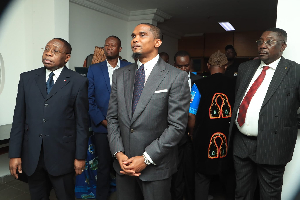(Being a paper presented at the Book Launch of Sammy Oke Akombi’s book “The Wages of Corruption” in Buea Mountain Hotel on Friday October3, 2014).
The book as the title suggests is on corruption. The book is a mirror of moral rectitude where attitude and aptitude are reflected; it is a courtroom where grief and greed are cross-examined and it is a classroom where human conscience and sexual perversion are taught.
The author, like a seasoned Hausa butcher has in 13 short stories and in 128 pages, exposed the putrescent bones and putrid meat of a once robust cow that has been killed by her own “nganakors”.
The stories are simple in style yet serious in message; pregnant with soul-searching rhetoric questions, subtle in tone but satirical in content. The author does not pretend to be prescriptive of the solutions to corruption. He has left that with politicians who are having a field day with slogans, prison sentences and National Anti-corruption corrupt Commissions.
Bends And Bumps of Corrupt-riddled Road The author instead engages the reader in a graphic narrative journey that lays bare the bends and bumps of a corrupt-riddled road.
Yes, after reading the book you may be tempted to say we have heard this before, but the author’s compelling stream of consciousness, his use of mind games, intrigues and suspense leaves the reader with the question “Why do we choose the vicious rather than the virtuous path to society’s renewal?” Self-examination, Introspection and Collective catharsis are bound to be your therapy to the author’s diagnosis.
The author did not start the discourse on corruption-corruption has become an international conversation since the era of slavery, colonialism to our present epoch of nominal or flag Independence; but the author departs from past narratives through a creative and conscious fusion of fact and fiction- a genre called faction.
The book is an indictment on what has already become our national emblem –in fact the book confirms that the flag of corruption is being hoisted daily in our schools, our offices, playground, our churches, our homes, on our highways, and on our air and sea ports, replacing some of our faded green, red and yellow cloth that was supposed to be the pride of our fatherland.
Three main stylistic approaches summarise this book: (i) the use of rhetorical questions (ii) contrast in character traits and (iii) the use of moral lessons that make the book an instrument of conscientisation.
Some of the rhetorical questions come from Chief Ngu Kechen who says “Whoever told you subjects deserve decency from their rulers?” or Pastor Aduma who asks “how can one add poverty onto poverty?” or the custom boss who asks “did you need to place a Mercedes 600 on your father’s grave?” or Dr. Tabufor who asks: “Has our level of corruption brought us this low?’ or Pius Ake (Chef de terre) who asks “who on earth can consider him or herself better than a landowner?” or the Vice-Chancellor who asks “Can you imagine Kikisangi becoming my successor, the boss of this institution?” or finally the S.D.O’s wife who asks “And who are you to refuse bribe from a whole Lamido?” No doubt therefore Pascalo Olingo concludes by saying “Here is a country with a difference. You must bribe to get recognized, no matter how worthy and useful you might be”.
At the level of character contrast, we find the gullible politician against the corrupt chief; the naïve Dad and his corrupt 13 year old daughter; Pius Ake the respecter of law against the Governor-the law breaker; the righteous Father Kikisangi against the lecherous Father Blondo; the cautious S.D.O and his scheming wife; the materialistic, yet realistic Pascalo Olingo against the altruistic, yet utopian Dr Kalawa; the meticulous Dr Tabufor against the crooked Colonel Zambo Zam; the epicurean Mr Kaloka and his frugal custom boss; the strict Justice Toki Joe against the seducing Jesco the jester; and finally the compassionate First lady against her insensitive President husband.
This use of parallelism gives the reader an insight into what society is and what society ought to be. And this is where the reader finds solace- that in the ocean of corruption there still exist islands of moral rectitude.
Character Islands These character-islands may be few but their consistency in positive values sheds a light on the moral depravity that has invaded the dark privacy of even our bedrooms.
These few character-islands give us hope that the tide of corruption shall be overturned someday like Jesus Christ brought Christianity to the world or like Nelson Mandela fast-forwarded political freedom in South Africa. This comes through when the author says “Excellence is very dependent on people; for there is usually an effort to identify excellent people to inculcate excellence in especially the young”.
Unfortunately like Father Kikisangi, Dr Kalawa or Dr Susuka, people who stand on high moral ground easily become the target of blackmail, character-assassination, career destruction and murder in the cathedral; people whose stories never get heard or who may be coerced to act against the dictates of their conscience. In the context of didactic or moral lessons, the characters themselves tell the story.
Hear them: “My son, crooked money may profit in the short term but never in the long term”; “If my innocent little girl could sacrifice her lunch pack only to perpetuate corruption in her school, then we have indeed sacrificed their whole generation”; “In life, we’ve got to be careful about the things we do ,something as sacred as marriage should not be built on corruption”; “You must watch out, you are herding people, not sheep”; and finally “In everything one does as a public servant, they have to be very careful; I can now see that I was sliding dangerously into gaining an entire world of wealth at the expense of my true life”.
“Na Who Well?” In virtually all 13 stories, the author gives money, the metaphorical and sometimes hyperbolic currency of corruption that buys and breaks. Money buys funeral rites, sexually transmitted marks, salvation in church, concubines, justice and even barren wombs. Money also breaks constituted law in public affairs and public protocol; it breaks Immigration laws and it even breaks the ekpe tradition.
In fact because the love for money has overtaken the power of love and because money, no matter how it is acquired has become the magic key that opens every door, a whole chapter in the book has been dedicated to the money monster that devours the innate decency of the high and the low as well as the spiritual and the mundane. If this book were to be translated into pidgin the title would be “Na who well?”
While this book tackles all facets of corruption, it is important to note that the book begins with a political corruption story set in a fictitious country called Griefland and ends with another political corruption story set in the same Griefland, with the same corrupt Chief, same gullible politician, same rent-seeking elite, same docile population and the same land of grief, yearning to be transformed into a land of glory, as if to say the more things change, the more they remain the same or as if to confirm the argument that political corruption is the be-all and end-all of our present condition of leadership inertia and state fragility.
Sammy, if your collection of stories is truly a reflection of our society today, then the novel “The Beautyful Ones Are Not Yet Born” by the Ghanaian author Ayi Kwei Armah must have been set in paradise.
In writing this book of faction the author has broken free from the cocoon of art for art sake to react positively to the words of Wole Soyinka who said “It seems to me that the time has now come when the African writer must have the courage to determine what alone can be salvaged from the recurrent cycle of human stupidity”. The author has risen to the level of social commitment which George Awoonor Williams of Ghana prescribes as he says “a writer must provide in his writings a certain articulate vision, which must provide order in his society because otherwise social life would be a very sterile and a very futile exercise”.
The author has used his intellectual arsenal to crusade against the “Boko Haramisation” of human conscience in consonance with Bate Besong’s words when BB says “True, the power of the writer is not always strong enough to change the political and social situation of his time but his art can become a fighting literature.
He can write works which are artistically profound and politically correct; he can write works of indictment and works that show how his world is and could be”. Sammy, if indeed as you write in your Disclaimer “that any resemblance in this book to actual persons, living or dead, events or locales is essentially one of incredible coincidence” then you must be a writer of incredible ingenuity.
Unfortunately, you contradict this “image of incredible coincidence” when in your Preface you write ”After establishing the credibility of Transparency International who twice have accorded our country the infamous first place in corruption…..I thought I should elicit awareness through the short story”. You have clearly done so.
This book is recommended for every public institution, for every home and school library, for every age group but most of all, for young people whose rebooted moral computer software must delete the virus of corruption from our society’s hardware.
And talking about young people and knowing Sammy to be principally a writer of young people’s literature one readily thinks of students being the direct target readers of this book, thus leading me to suggest very strongly that this book be placed in our national school text book list.
But Sammy, to add to the list of your corrupt-related rhetorical questions you have spiced this book with, let me ask you “What do you have to do to get this book in the National list of school text books next year?” Ladies and Gentlemen, the book has been served; buy more than one copy and enjoy your intellectual meal.
Opinions of Saturday, 11 October 2014
Auteur: Mwalimu George Ngwane














